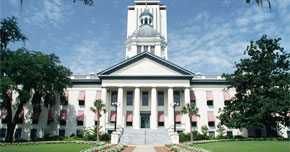Overtime Looming For Lawmakers; Won’t Be Able To Wrap Budget By May 1
April 16, 2015
Ending weeks of speculation, Republican legislative leaders Wednesday acknowledged they won’t be able to wrap up budget negotiations before the scheduled May 1 end of the 2015 session.
“I don’t see a way to end the session on the 60th day,” Senate budget chief Tom Lee told The News Service of Florida.
“I would agree,” House Speaker Steve Crisafulli, R-Merritt Island, told reporters later Wednesday when asked about Lee’s comment.
 Uncertainty about the federal government’s funding of the Low Income Pool, or LIP, program is at the heart of the impasse. The program funnels money to hospitals and health providers that provide care for large numbers of uninsured and low-income Floridians.
Uncertainty about the federal government’s funding of the Low Income Pool, or LIP, program is at the heart of the impasse. The program funnels money to hospitals and health providers that provide care for large numbers of uninsured and low-income Floridians.
Gov. Rick Scott’s administration, federal officials and House and Senate leaders have waged a public war over the LIP negotiations, which President Obama’s administration declared Tuesday are tied to an expansion of Medicaid.
The Senate included $2.2 billion for a modified LIP program in its budget plan and set aside another $2.8 billion in federal Medicaid-expansion funding to create a program that would help low-income Floridians buy private health insurance.
The House spending plan does not include money for the LIP program, with key lawmakers saying that including the money would be premature. And House leaders, including Crisafulli, have rejected outright proposals to expand coverage through Medicaid or the proposed Senate program.
Scott sent Obama a letter earlier this year stating he would not use any money from the state’s general-revenue fund to make up any shortfalls, should the federal government reduce or cease its contribution to the LIP program.
The battle over the health-care issues has erupted in a flurry of memoranda and e-mails sent by Crisafulli, Senate President Andy Gardiner, the Scott administration and the federal Centers for Medicare & Medicaid Services and has cast a pall over the 2015 session in a year when lawmakers expected to have a $1 billion budget surplus.
“I’m trying to keep the conversation civil, keep it focused in the present. But there is a huge policy divide here. And I don’t see how you bridge it in the time that we have available. In fact, you cannot bridge it in the time we have available. So the only question now in my mind is, are we in extended session or are we in special session?” said Lee, a Republican from Brandon who served as Senate president when the LIP program was first established nearly a decade ago.
Crisafulli said it is too early to tell whether lawmakers will extend the current session or pack up and come back some time later to reconcile the budget. Lawmakers must pass a new budget before July 1, when the new fiscal year starts.
Because of the schism over health-care spending, legislative leaders have not yet determined the overall allocations for each area of the budget. Crisafulli said an extended session would be possible in the unlikely event that budget negotiations were already underway by May 1.
“But if we’re not, there’s no reason to kid ourselves. We’ll finish up the business that we have on the policy and then we can come back and do a budget at a later time,” he said.
Other Medicaid-related concerns may also deepen the health care divide.
Lee said he is waiting for more information about the Medicaid program, which now enrolls nearly all beneficiaries in managed-care plans.
“We have mounting actuarial evidence that the Medicaid managed care rates in Florida are actuarially unsound. That’s a quarter-of-a-billion-dollar problem on top of the backfilling that would make LIP whole,” he said.
Florida schools will also have 15,000 more children than originally anticipated, meaning that lawmakers will have to come up with more money to meet Scott’s priority of funding education at record-high levels, Lee said.
“So we’re getting a lot of additional news as the session progresses that’s making it much, much more difficult to resolve our differences,” Lee said. “And that’s kind of what gave rise to doing a budget that’s lean and mean. The challenge with that is sometimes it’s hard to pass a budget that funds nobody’s priorities. What’s the motivation to hit the green button?”
One way to resolve the budget divide would be “if nobody gets what they wanted,” Lee said.
“The (Senate) president doesn’t get a health care solution. The governor doesn’t get his tax cuts. And we put $2 billion in reserves and wait and see what the federal government says. We would have a budget in place. We would just have $2 billion in reserves. And we could come back here and we could deal with tax cuts and health care funding at the appropriate time. That is an option that we could certainly consider collectively,” Lee said.
But Crisafulli made clear he doesn’t want to dip into reserves to cover health-care expenses.
“I’m not interested in using reserves. Reserves are something that are there for that day that comes along that you’re not prepared for, whatever comes along, whether it be hurricane season. It could potentially be an irresponsible move to hit the reserve fund in a magnitude that would affect that,” he said.
by Dara Kam, The News Service of Florida



Comments